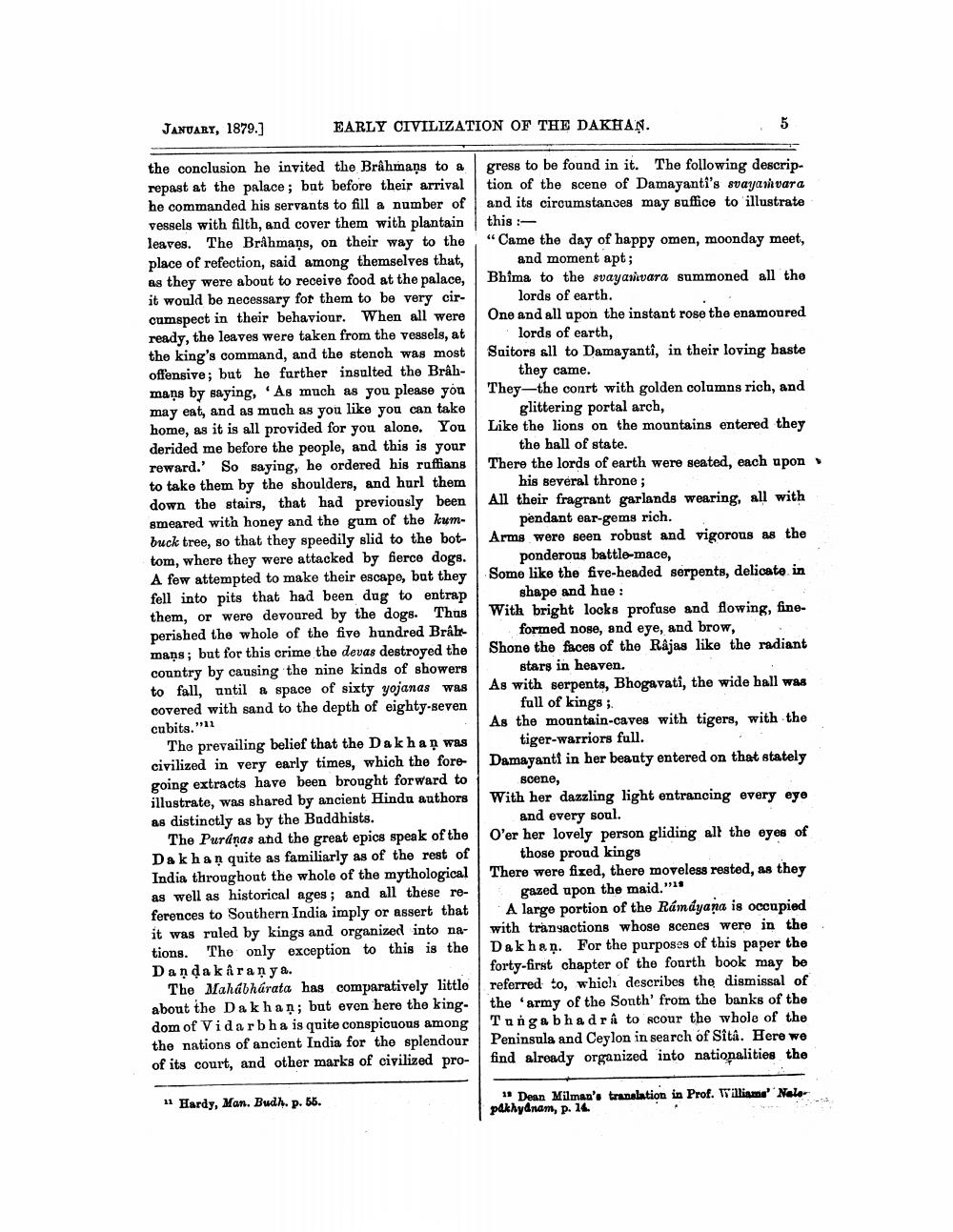________________
JANUARY, 1879.]
the conclusion he invited the Brahmans to a repast at the palace; but before their arrival he commanded his servants to fill a number of vessels with filth, and cover them with plantain leaves. The Brahmans, on their way to the place of refection, said among themselves that, as they were about to receive food at the palace, it would be necessary for them to be very circumspect in their behaviour. When all were ready, the leaves were taken from the vessels, at the king's command, and the stench was most offensive; but he further insulted the Brâhmans by saying, 'As much as you please yon may eat, and as much as you like you can take home, as it is all provided for you alone. You derided me before the people, and this is your reward.' So saying, he ordered his ruffians to take them by the shoulders, and hurl them down the stairs, that had previously been smeared with honey and the gum of the kumbuck tree, so that they speedily slid to the bottom, where they were attacked by fierce dogs. A few attempted to make their escape, but they fell into pits that had been dug to entrap them, or were devoured by the dogs. Thus perished the whole of the five hundred Brâhmans; but for this crime the devas destroyed the country by causing the nine kinds of showers to fall, until a space of sixty yojanas was covered with sand to the depth of eighty-seven cubits."11
EARLY CIVILIZATION OF THE DAKHAN.
The prevailing belief that the Dakhan was civilized in very early times, which the foregoing extracts have been brought forward to illustrate, was shared by ancient Hindu authors as distinctly as by the Buddhists.
The Puranas and the great epics speak of the Dak han quite as familiarly as of the rest of India throughout the whole of the mythological as well as historical ages; and all these references to Southern India imply or assert that it was ruled by kings and organized into nations. The only exception to this is the Dandakâranya.
The Mahabharata has comparatively little about the Dakhan; but even here the kingdom of Vidarbha is quite conspicuous among the nations of ancient India for the splendour of its court, and other marks of civilized pro
11 Hardy, Man. Budh. p. 55.
5
gress to be found in it. The following description of the scene of Damayanti's svayamvara and its circumstances may suffice to illustrate this:
"Came the day of happy omen, moonday meet, and moment apt;
Bhima to the svayamvara summoned all the lords of earth.
One and all upon the instant rose the enamoured lords of earth,
Suitors all to Damayanti, in their loving haste they came.
They the conrt with golden columns rich, and glittering portal arch,
Like the lions on the mountains entered they the hall of state.
There the lords of earth were seated, each upon his several throne;
All their fragrant garlands wearing, all with pendant ear-gems rich.
Arms were seen robust and vigorous as the ponderous battle-mace,
Some like the five-headed serpents, delicate in shape and hue:
With bright locks profuse and flowing, fineformed nose, and eye, and brow,
Shone the faces of the Râjas like the radiant stars in heaven.
As with serpents, Bhogavati, the wide hall was full of kings;.
As the mountain-caves with tigers, with the tiger-warriors full.
Damayanti in her beauty entered on that stately
scene,
With her dazzling light entrancing every eye and every soul.
O'er her lovely person gliding all the eyes of those proud kings
There were fixed, there moveless rested, as they
gazed upon the maid."
A large portion of the Rámáyana is occupied with transactions whose scenes were in the Dakhan. For the purposes of this paper the forty-first chapter of the fourth book may be referred to, which describes the dismissal of the army of the South' from the banks of the Tungabhadrâ to scour the whole of the Peninsula and Ceylon in search of Sîtâ. Here we find already organized into nationalities the
1 Dean Milman's translation in Prof. Williams' Nale pakhyanam, p. 14.




